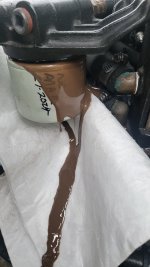The video linked in post #1 shows what I would say is close to normal operation for your engine with a weber carb and choke stove
The stove cover for the choke coil spring appears missing which accounts for the extended period choke operation along with running the engine on muffs at an idle (no load). Takes a long time under these conditions for the engine to fully heat up to spec temp. Not to mention weber carbs are basically toilet bowls and run pretty rich at startup with no load
The choke stove assy, when fully operational is designed to open faster than you recorded when under a load. The engine assy heats up faster and the stove cover keeps heat surrounding the spring
For your latest post with compression numbers seeing 95, 120, 140 and 160 doesn't mean much for a cold engine not run for six months especially if it was fogged at layup. The 95 might be concerning but it's best to get the engine running under a load for 10- 15 mins to clear it out. Then do a compression test with warm engine.
As far as getting the engine running it sounds like the carb is flooding out. Can't say as to where you're at with it but it's an indicator of wrong float height, bad needle/seat, plugged idle circuits, too high fuel pressure (9-10 psi sounds high but is probably okay with a sound carb), incorrect timing, etc...Probably means going through the carb again and setting up with quality parts




















